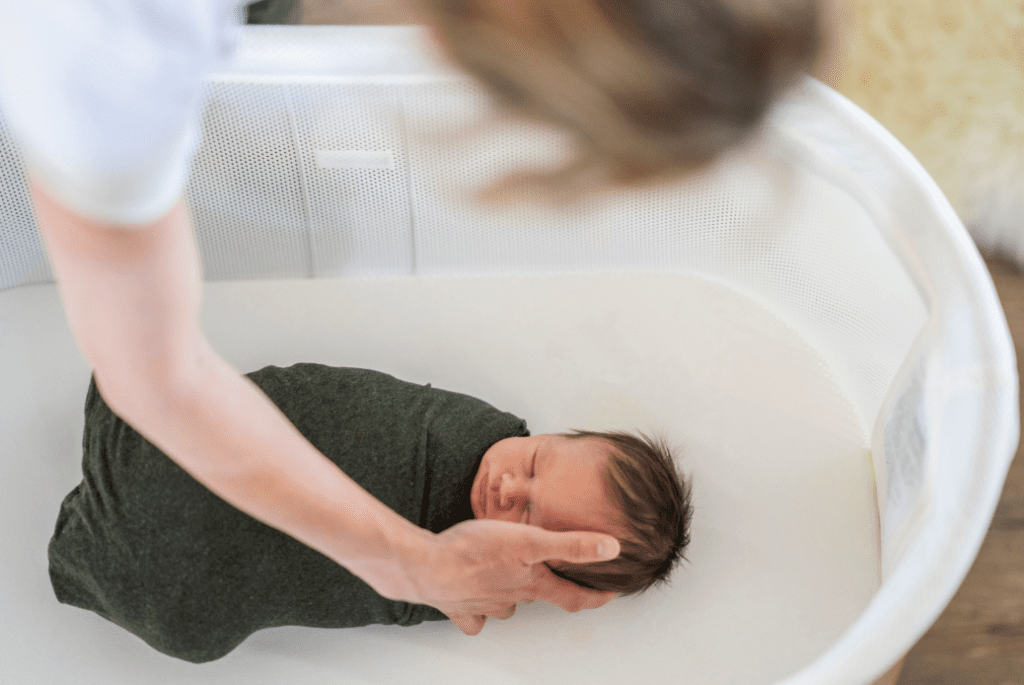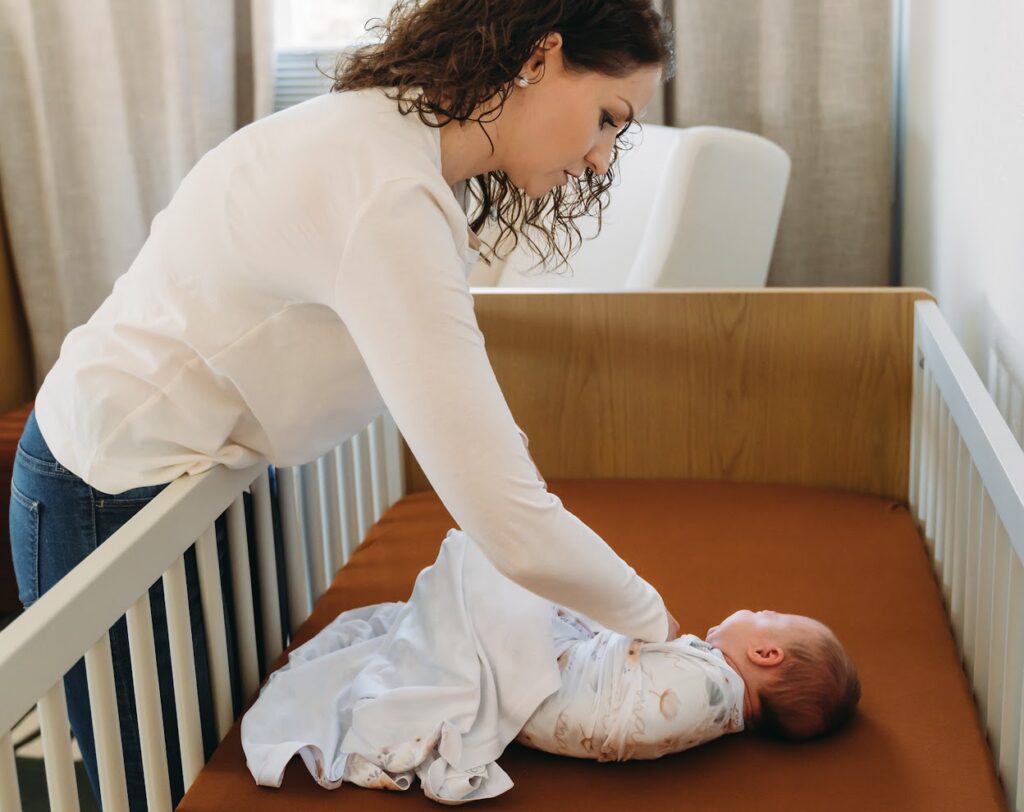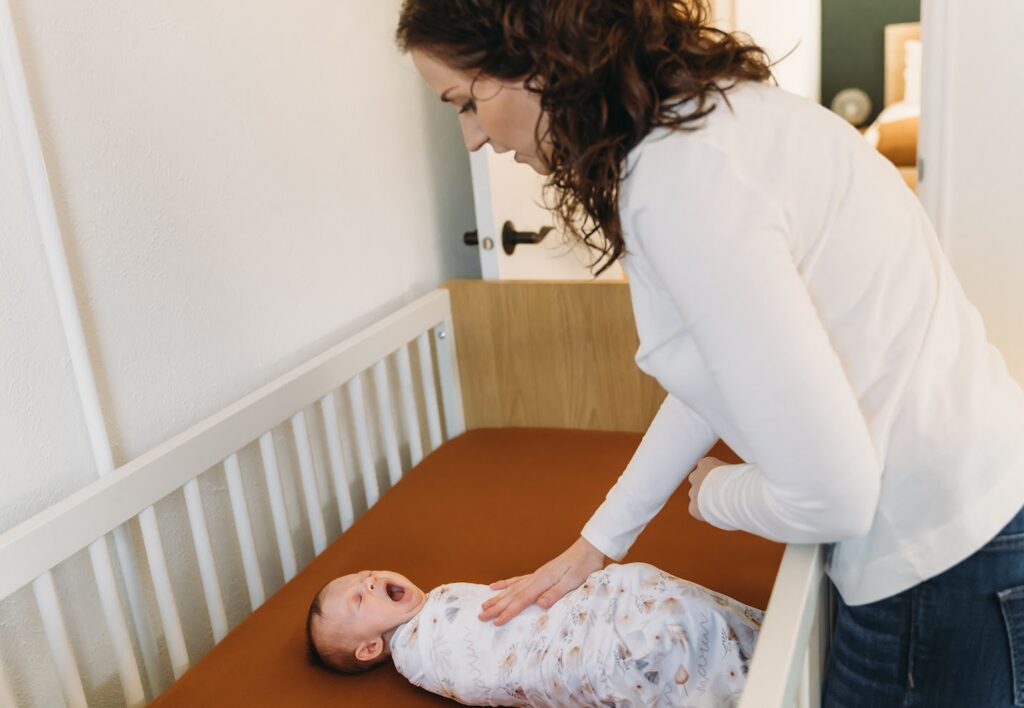One of the biggest struggles that parents have to tackle in the first few weeks and months of having a new baby is sleep. When your baby isn’t sleeping, YOU aren’t sleeping! A tired parent can quickly become a stressed and overwhelmed parent and the same applies to your baby.
Now, there is no one “magical” solution to getting your newborn to sleep. Getting your newborn to sleep is a mix of understanding their needs and cues, creating a sleep environment conducive to safe and restful sleep, and understanding how different habits and routines can help OR hinder your baby’s sleep.
Once you have a good idea of why your baby is not sleeping, then you can follow my tips for getting your newborn to sleep at night that are relevant to your situation. Or, follow my tips for the daytime if you need help getting your baby to sleep better during the day!

Why Your Newborn is NOT Sleeping at Night (or During the Day)
It’s important to understand that when people say their baby “sleeps through the night,” they don’t mean that literally. Just like adults, babies wake multiple times at night in between sleep cycles. So a baby who “sleeps through the night” still wakes, but is capable of falling back asleep on their own. Newborns obviously don’t actually sleep through the night at first because they need to wake up at least every few hours to eat. Still, newborns sleep a lot. Up until they are 8 weeks old, babies should be sleeping 16-20 hours per day!
So what happens when your newborn is not sleeping 16-20 hours per day? They are more fussy or “clingy,” have a harder time falling asleep, and it can be difficult to keep to any sort of predictable routine. Plus, when your newborn doesn’t sleep, you don’t sleep! Mommas need sleep too, and a newborn who can’t sleep more than 20 minutes at a time without being held or offered your boob or a pacifier is not what you need when healing postpartum.
While there are quite a few things that can help your newborn fall asleep (and stay asleep), there are also a few situations that could be causing your newborn to NOT sleep well – or for very long – either at night or during the day. Let’s touch on some of the most common reasons newborns are not getting enough sleep:
#1. They’re Beyond Their “Awake Time Limits”
Did you know that newborns have awake time limits? These are commonly called “wake windows.” There is a limit to how long babies can stay awake between sleep periods before they become overtired. Being overtired makes it much more difficult for them to fall asleep.
When your baby is overtired, they will be fussy while awake, won’t be able to fall asleep easily, and will typically cry more than usual when being put down for their nap or to sleep overnight. Overtiredness can also cause disrupted nighttime sleep.
This often baffles new parents – if the baby is so tired, why do they fight sleep? It’s actually due to a built-in survival mechanism! When any human – baby, toddler, child, or adult – pushes their body past its limit for needing rest, our brain assumes there must be some really important reason we need to stay awake. So it pumps our body full of adrenaline and cortisol (the stress hormone). So then when we do try to go to sleep, we’re too “wired” to settle easily into sleep.
This is why it’s so important not to push your baby past their wake window. Keeping them up longer during the day actually will NOT help them sleep longer overnight! For newborns, wake windows are only around 30-60 minutes the first two weeks, 45-75 minutes from 2-4 weeks, and then 60-90 minutes from 4-12 weeks. This includes feeding time. That means that sometimes your baby will be ready to go down for a nap as soon as you finish feeding them and changing their diaper!
#2. They’re Not Being Swaddled Properly

I’ve never met a baby that hates being swaddled when it’s done correctly. While some parents might think their baby “hates being swaddled,” it’s actually much more likely that you’re swaddling your newborn incorrectly.
When babies aren’t swaddled, the “Moro” or startle reflex can cause them to startle themselves awake frequently. It can also feel very disconcerting for a baby who is so accustomed to being very tightly cradled in the uterus 24/7 to then be completely free to move around. Early on, babies have very little control in coordinating their limbs, and so they may be flailing around at times and have no idea how to settle their body so they can fall asleep (and stay asleep).
#3. There is Too Much Light During Naptimes/Sleep
Babies thrive in a sleep environment that is designed for better sleep and that environment might look a little differently than you would expect. For example, your newborn is not afraid of the dark. In fact, you want to keep your baby’s bedroom or sleep space dark for all sleep times. Yes, EVEN for naps. And NO, this will not cause day/night confusion.
You can allow some light in when sleeping during the day – it doesn’t need to be pitch black. But there should be a noticeable difference when compared to how light the room is during regular daily activities like feedings and playtime.
#4. They Rely on “Sleep Crutches”
Sleep crutches are anything that your baby relies on to fall asleep or stay asleep. Also called “sleep associations,” sleep crutches are considered “negative” associations because they are things that cannot be easily replicated in a different environment or that require ongoing intervention and help from you.
Remember how babies naturally wake between sleep cycles? Oftentimes, poor sleep is due to sleep crutches because whatever the baby needed to initially fall asleep at bedtime or at the start of a nap, they will need again to go back to sleep. They will potentially need that sleep crutch in between every sleep cycle, which means in the middle of every nap, and multiple times throughout the night. Plus they might need their sleep crutch anytime their sleep is disrupted by noises, having gas, etc.
The most common sleep crutches are:
– needing to nurse or have a bottle to fall asleep
– having to be held or in motion (e.g. rocking, bouncing, in the stroller or car) to fall or stay asleep
#5. They aren’t getting full feedings.
Hungry babies do not sleep well or long. Even if they aren’t “hungry” but just aren’t fully satisfied, they may struggle to stay asleep until their next daytime feeding or may struggle to go long stretches at night without eating.
Not getting full feedings is really common with newborns because they fall asleep so easily! Sucking on the breast or a bottle is very soothing and can lull babies to sleep shortly after starting to eat. This takes the edge off their hunger, but doesn’t give them a chance to eat as much as they are hungry for. So they will take short naps because they are waking up and already wanting to eat…and/or they may wake frequently overnight to try to make up for the calories they didn’t get during the day.
How to Help Your Newborn Sleep Better at Night and for Naps
Now that you have a pretty good idea of why your newborn is not sleeping at night, or taking great naps during the day, let’s review some of the tips that can help your newborn sleep.
Note: when it comes to eating/feeding overnight, consult with your pediatrician to get the all-clear. Usually, you will need to wake your baby to eat every 3 hours until they are back to birth weight. And then in most cases, the pediatrician will give the okay to let them go as long as they want overnight. In my experience, newborns can typically go one long stretch overnight equal to their age in weeks. For example, a 6-week-old can go about 6 hours between their bedtime feeding and their first overnight feeding, but then will likely need to eat every 3-4 hours the rest of the night.
In order to help your newborn sleep at night for the maximum length of time they are capable of going between feedings, the key is to start building healthy sleep habits as soon as you can. You can actually start these habits from birth!
Implementing healthy sleep habits for your newborn is going to make sleeping much easier, much sooner than you may have even thought possible! And the good news is it doesn’t need to be all or nothing! It won’t ruin your newborn’s sleep if you aren’t following every healthy sleep habit all day and night, every single day. Just do them when you can and feel up to it, and don’t stress if they aren’t happening. It’s simply a goal to keep working towards!
Here are five of my top recommendations for helping your newborn sleep better at night and during the day:
1. Create a primary sleep space:
Put your newborn in their crib or bassinet (wherever they sleep at night) during naptime too whenever you are at home. The more you use this sleep space, the better your baby will get at sleeping there. And so the more you have them sleep there during the day – when it’s usually easier to practice the other healthy sleep habits – the better they’ll be at sleeping there overnight!
2. Make sure your primary sleep space, and anywhere else your baby sleeps, mimics the womb:
Try a white noise machine: Use loud white (or brown/pink) noise for every sleep. I recommend setting the volume to be 55-60db as measured from your baby’s head. Many parents worry about their baby relying on white noise to sleep. But white noise is actually considered a positive sleep association, rather than a negative one, because it promotes deeper, less disrupted sleep. So yes, your baby may need it to sleep well, but with so many portable sound machines and apps, it’s very easy to provide this sleep association even when you are on the go or traveling.
Swaddle your newborn for every sleep. In my experience, newborns LOVE being swaddled and will sleep much longer stretches as long as you swaddle them very tightly with their arms straight down at their sides. You don’t want their arms to be able to move across their chest because then it’s kind of like how it feels when your sock is half off. You want it on OR off, and your baby wants their arms snug at their side OR out. Since they won’t sleep well arms out until the Moro reflex fades, you want to keep their arms snug. If they can move from being straight down at their sides, they will end up squirming and struggling to get in a more comfortable position, disrupting their sleep. My favorite escape-proof swaddles are the Miracle Blanket or Butterfly Swaddle.
Finally, as I mentioned above, make sure their sleep space is dark.
3. Watch for sleepy cues and aim to put your newborn down for a nap before the end of their wake window:
Most new parents recognize sleepy cues such as yawning and fussing or crying. These are actually late-stage cues! Ideally you will be about to put your baby down when these show up, or even put them down before they show up. Early-stage cues to watch for in newborns are looking away when you try to make eye contact, appearing as though they are “zoning out,” and flushed eyebrows.
Even if your newborn isn’t showing any sleepy cues, you still want to wrap up whatever you’re doing at least 5-10 minutes before the end of the max wake window for their age. This gives you time to change their diaper and get them swaddled, close the curtains and turn on the white noise, and then still give your baby a few minutes to self-settle and fall asleep.
4. Whenever possible, put your baby down for sleep times awake, or drowsy but awake:

Let your baby fall asleep on their own if they can, even if it takes them a few minutes to settle. Newborns who aren’t overtired and have gotten a full feeding usually don’t cry when put down as long as they are in an environment conducive to sleep (see tip 2) and are used to their sleep space (see tip 1).
So if your baby has been fed and changed, then you can give your them a few minutes to fuss as they get used to their sleep space. You are simply giving them the opportunity to fall asleep (or fall back asleep) independently. You’ll be surprised how quickly they can learn this when set up for success! But if they are actually crying (not just fussing or whining a bit) or haven’t fallen asleep within 10-15 minutes, then go ahead and help them to sleep. Then try again next time and just keep practicing!
This tip and the previous one go hand in hand because it’s really hard to put your baby down awake if it’s past their wake window. They will either be overly fussy and unlikely to be able to settle on their own, or they will have already fallen asleep in your arms, in the stroller, etc.
Nighttime: cut out the “awake” periods after feeding overnight. Your overnight feedings should be “all business.” Keep the room dark and quiet, and reduce stimulations so that your baby can go right back to sleep after eating, but still try to put them down awake instead of feeding to sleep and then transferring them to their sleep space. Changing their diaper once you’re done feeding is a great way to wake them back up before putting them down.
5. Make sure your baby is getting full feedings:
The simplest way to ensure full feedings is understanding that a feeding is not over until your baby is awake and refusing to eat more. Falling asleep doesn’t count as being done! You have to wake them up and offer again, and then have them show you they don’t want any more by refusing to latch, turning or pulling away from the breast or bottle, or having the nipple in their mouth but not actually sucking anymore.
So giving a full feeding does not mean forcing your newborn to eat or pushing them beyond their body’s capacity! It just means you are helping your newborn to stay awake and encouraging them to eat as much as they are hungry for, rather than just until the soothing act of sucking on a breast or bottle causes them to fall asleep.
If you’re still having trouble getting your newborn to sleep, check out my Newborn Sleep Shaping Guide. You’ll get a thorough and holistic plan for both daytime and nighttime that addresses all the key areas that contribute to success with sleep, and will teach you how to train a newborn to sleep through the night by the time they are 10-12 weeks old!
Leave a Reply
Contact
THANK YOU!
We received your information and we will be in touch soon. Please allow 48 hours response time.

[…] feeds are essential to sleeping longer at night, and eventually night weaning, because they help your baby take in as many calories as possible […]
[…] pretty much made it out of the roughest time after giving birth. Now, you can look forward to your newborn sleeping through the night – or rather, you can start working with your newborn to get them to sleep through the night! […]